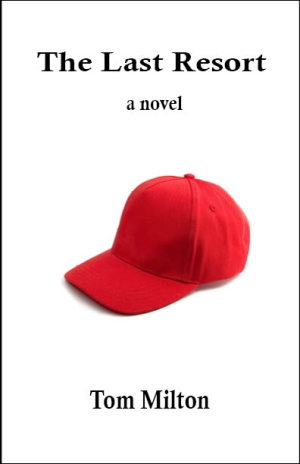The Last Resort
The Last Resort is a sincere human interest tale couched in an informed overview of current events.
In Tom Milton’s novel The Last Resort, two protesters find that confronting their enemies in person could be a nightmare come true.
The setting is New York City during the most recent presidential campaign. Elsa is a Dominican psychology professor carrying a sign that reads “love will prevail.” Karl is a laid-off factory worker who’s now aligned with a white nationalist group; his sign reads “make America white again.” The two stare at each other from across the street.
When a shot is fired and the gun that issued it is thrown in front of Karl, Elsa watches him pick it up. She intuits that he means to keep it from wreaking more havoc. She speaks to the police on Karl’s behalf and provides him with a place to stay while he avoids potential fallout from his fellow protesters. Over the course of a few days in each other’s company, Karl changes his mind about the white nationalist movement, and Elsa changes her mind about white men.
The plot follows a formulaic pattern. Meetings between Karl and Elsa, along with her family and friends, alternate with flashbacks to their pasts. Written in straightforward, assertive prose, the threads are chronological and easy to follow. Past experiences help to make sense of present situations.
Karl and Elsa develop into thoughtful, well-intentioned characters. Details about their hometowns in Ohio and the Dominican Republic fill out the New York setting, and they speak with candor about America’s economic morale and desperate immigrant stories. Ancillary characters, including Elsa’s mentors and friends and Karl’s wife, are more one-sided and speak as though they have all the answers.
Conversations follow a predictable and stilted pattern of questions and answers. Karl and Elsa are thoughtful but stiff. They convince one another to change their minds via their rhetoric and token gestures, causing a domino effect of change, but it is hard to relate to them on a more individual level.
The text is dry in tone, its descriptions cerebral rather than visceral. Facts and statistics from many perspectives on immigration, economics, and politics are shared, and the pacing is steady, but the book comes to read more like a newspaper piece than a novel.
Toward the end, Karl’s group comes after him, but this climax pales in comparison to the relationship Karl and Elsa established. The characters are transformed in a hopeful ending, becoming more dimensional to one another than before. Discussion questions and an interview with the author enhance the reading experience.
Emphasizing people over politics, The Last Resort is a sincere human interest tale couched in an informed overview of current events.
Reviewed by
Mari Carlson
Disclosure: This article is not an endorsement, but a review. The publisher of this book provided free copies of the book and paid a small fee to have their book reviewed by a professional reviewer. Foreword Reviews and Clarion Reviews make no guarantee that the publisher will receive a positive review. Foreword Magazine, Inc. is disclosing this in accordance with the Federal Trade Commission’s 16 CFR, Part 255.

